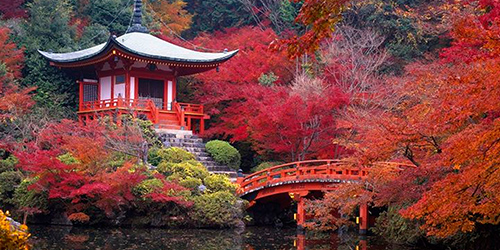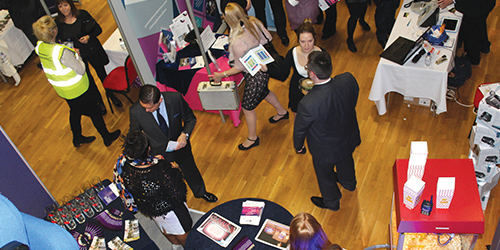
When you think of Tokyo, what images come to mind? Extreme freneticism, neon signs stacked on top of each other like Jenga pieces, crowded streets, steaming bowls of ramen noodles, geishas? Or perhaps scenes from Lost In Translation – Bill Murray and Scarlett Johansson negotiating their way through karaoke bars, a sprawling metro network, and a solid language barrier.
How about the fact that Tokyo came out on top of the Economist’s Safe Index 2015 – which ranked 50 cities based on factors such as digital security, infrastructure quality and personal safety? Or the fact that Tokyo is home to more Michelin-starred restaurants than anywhere else in the world (226 to be precise) Or, maybe you think of the 2020 Olympics – which if the rumours are true, will involve man-made meteor showers at the opening ceremony, and robot judges that will measure the precision of gymnasts’ rotations to the nth degree?
“With the Olympics coming up, Japan presents a big business opportunity, and the desire to deal with the outside world is strengthening,” says Chiara Terzuolo, Tokyo resident and market manager for an online travel company. “They are adding hotels at a rather extraordinary rate here, and renovating the train systems in preparation to deal with having four times the usual number of people coming and going through them – Japan prepares!”
Being the largest city in the world, with more than 98,000 hotel rooms to off er already, Tokyo is better placed to cope with an Olympic-sized crowd than most destinations.
The buzz surrounding the Japanese capital right now is attracting the attention of investors and meetings organisers alike. “Japan is fast becoming one of the most popular meetings and events destinations in Asia, with the prospect of the 2020 Summer Olympics expected to bring spectacular opportunities,” says Scott Pawley, General Manager of Global Travel Management (GTM).
“Tokyo is an amazing, beautiful city with stunning views. You have places such as the Asakusa District, the Imperial Palace, Meiji Jingu Shrine representing Tokyo’s 400- year history, as well as state-of-the-art skyscrapers and cutting-edge design. It’s also an economic powerhouse, and is home to the headquarters of many major corporations.” For conferences, the Tokyo International Forum is the one. The city’s largest venue’s soaring atriums and immaculate theatres are world-class, with 34 meeting spaces to choose from, and a 5,000 sqm exhibition hall. For sparkling city views, Roppongi Hills Club on the 51st floor of Roppongi Hills MoriTower is a refined setting for a drinks reception for up to 300 guests. And on the fifth and sixth levels of Tokyo Skytree – the highest freestanding broadcasting building in the world – you’ll find the Sumida Aquarium, which can be hired exclusively for a networking event for 300 people. The 50-metre long “Jellyfish Kaleidoscope tunnel” adorned with neon artwork and tanks filled with glowing jellyfish would certainly be a talking point.
The ideal time to visit Tokyo is in Spring. From March to May, temperatures tend to top off at 20ºC, and the city’s cherry blossom season provides a magnificent backdrop for outdoor events.
September to November is also a great time to visit, when the cooler temperatures return after extremely humid summer months, and the maple trees’ leaves turn a fiery orange hue.
When planning travel to the Japanese capital, be sure to choose the arrival airport carefully, if you have the option. “Narita is the big international airport, and it’s extremely disappointing,” says Terzuolo. “It doesn’t have the amenities you would expect from a major airport, such as 24-hour food – dinner is over by 8pm, so if you have a late night flight, good luck to you.
“Haneda is really the best airport – it’s much closer in, and they put a lot of money in to making it quite beautiful and interesting. It has great food and lots to took at, and is only a 40-minute train ride into the city rather than two hours – definitely fly into there if you can.” BA flies into both airports from London Heathrow, codesharing with Japan Airlines (JAL) on its Narita flights.
We all have our preconceptions of Japan, which create a definite sense of anticipation essential for boosting attendance to any corporate event or conference. A sensory feast, full of intrigue and quirkiness, Tokyo certainly won’t disappoint. “For me, it’s the hospitality and attention to detail,” says Pawley. “You just fall in love with the place.”
Best Tokyo Districts For Bars
Looking to impress a new client, or explore Tokyo’s nightlife with your colleagues? Consider which of these areas of the city might be best…
Ginza – a good area to take potential clients that you’re looking to impress. It’s fairly quiet, with high-end, established options.
Nihonbashi – close to Tokyo Station, there’s great choice here from reasonably-priced places to extremely expensive ones.
Roppongi – often quoted as the best place to go for nightlife, though quite seedy in places (the “hostess bars” might be less popular with certain members of your group)
Shinjuku – as above, though, if you’re after something outrageous, Robot Restaurant (shinjuku-robot.com), where bikini-clad dancers share the stage with robots, is definitely different.
Ebisu – cheap, cheerful and local, with plenty of izakayas (Japanese gastropubs) and street hawkers selling yakitori (grilled chicken skewers).
Ideal Itinerary
Scott Pawley recalls an unforgettable Tokyo trip GTM arranged for a corporate group:
“We recently booked an event with a stay at the Mandarin Oriental, which is truly stunning, with views of Mount Fuji and state-of-the-art conference facilities.
“The group took the chance to see the city and shop. They dined in unique restaurants and took a boat ride in Tokyo Bay - the colours and the atmosphere of the busy streets did not disappoint.
We also arranged for the group to take the bullet train out to Mishima Skywalk, which, at 400 metres long, is the longest pedestrian suspension bridge in Japan. It is the newest location for a brilliant view of Mount Fuji, the highest peak in Japan, and also Suruga Bay, its deepest bay. The bridge shakes a bit, which made it a little more fun. We then took one of the pirate style ships on Lake Ashi, which gave the group some fantastic photo opportunities.”
Doing Business In Tokyo - The Lowdown
Originally from the US, Chiara Terzuolo, has lived and worked in Tokyo for five years. Here are her tips for those doing business in the Japanese capital.
- For business people coming here and dealing with Japanese companies, one thing they’ll immediately see, is that the amount of bureaucracy is much greater than elsewhere. Everything needs to be approved, and you usually have to ask three or four managers for things that don’t normally need asking. This is something that typically frustrates foreign business visitors.
- You need lots of patience, and to be prepared to follow up. Getting a response is very complicated, you need to understand that even if people say “yes, let’s go forward with this,” there’s still the chance it will take six months to get there – even if it would normally take a month elsewhere.
- Being overly pushy is definitely a no-no. In Japan, it’s all about the harmony of the group. That’s slowly dissipating, as start-ups are gradually taking over, which is great, so people who are very driven can do well. But being very blunt is not good either. Couch your words carefully: “That idea sucks” should be replaced with “I see what you mean, but…”
- Be careful with business cards – you don’t stuff them in your back pocket, that’s near your butt, don’t do that! Put them in a case or your front pocket. Don’t bend them or rip them and take them with both hands. It’s basically seen as an extension of that person, it’s their calling card. Take it, take a look at it, and thank them for it.
- Wear a suit. Japan is still a relatively conservative country. If you’re a music producer, you can get away with leather trousers, but otherwise it’s not going to fly. However, summer here is really hot and muggy, and so from June until September, polo shirts are ok – no ties or jackets needed.
- There’s a good chance that nobody will speak English very well, with the exception of the elite companies, or it will be very basic. However, people might understand more than they speak – most can understand a degree of English, so no badmouthing people on the metro!
- Going out drinking with potential business partners is very useful at times. You’re out of the office, in an informal situation, and it’s a very good opportunity to drag bits of information out of your counterparts. Do they actually think it’s a good idea? Will they go ahead with it? Is there anything they’re worried about? These are the kinds of things you can find out in this situation.
- Most Japanese business people are aware that their norms are not the same as other countries – unless you’re dealing with super traditional small places.
- General practice is to be polite and respectful.






